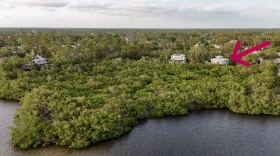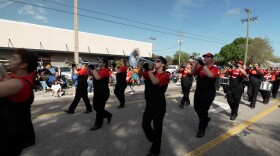Captive wildlife hunting, also known as “canned” hunting, is legal in the state of Florida. These are facilities that are fenced in, where people pay to hunt native and exotic species. The proposed ban on captive wildlife hunting would make it illegal in the state
The proposed amendment says captive wildlife hunting disrupts the delicate balance of ecosystems and puts Florida’s biodiversity at risk.
Kate MacFall is the Florida State Director for the Humane Society of the United States. She says captive hunting can go by many names, but it all comes down to hunting animals that are not wild and are fenced in.
"Hunters pay big money to come and shoot an animal that's behind the fence," says MacFall.
Prices to kill at these facilities can range wildly, from a few thousand dollars up to the twenty thousand dollar range, depending on the species.
"We oppose trophy hunting, and this is a special kind of trophy hunting, that's even worse than regular trophy hunting, if you will. The animals are bred. And some are used to people that are not wild… they're put behind a fence for wealthy shooters who maybe don't have the skill or want to put the effort into an actual fair chase hunt," says MacFall.
A fair chase hunt is often considered the ethical and sportsmanlike way to hunt, permitting the taking of a free-range, wild game animal in a manner that does not give the hunter an unfair advantage.
"As a civilized society, we have got to say, no more," says Chuck O’Neal, the Chairman of the Florida Rights of Nature Network, and he is chairman of the FL5 DOT Org Political Committee. O’Neal hopes the majority of Florida voters will agree.
Tish O’Dell, community organizer with the Community Environmental Legal Defense Fund, or CELDF, worries the proposed ballot amendment is not really about the rights of nature.
"It doesn't create a right of nature to exist... And also, people aren't given the right by this new law to go to court and protect the animals," says O'Dell.
Florida Fish and Wildlife Conservation Commission told us, via email, that Florida’s captive wildlife regulations are among the most stringent in the nation, and that FWC investigators conduct inspections of the state’s 443 game farms and 143 hunting preserves to ensure compliance.
Diana Dean, also known as Grandma Dean of Ron’s Guide Service, works with her family farm, near Lake Okeechobee. They offer alligator and hog hunting on their private property, which is fenced to keep the cattle in--but does little to keep hogs or alligators in, or out.
"So I think that what we offer is, you know, people to come out here have a hunting experience. They're hunting hogs, which... are very destructive and invasive, and they're also getting delicious meat from it. Most of our hunters are coming here to teach their kids about hunting and you know where meat comes from, the meat that they eat," says Deane.
While she supports the proposed Florida Iconic Species ballot amendment, she worries the way the captive hunt ballot amendment is written doesn’t take into account businesses like hers.
"I feel like it should be if you're gonna say captive, captive hunting is banned, you need to specify, Well, what are we talking about? What species are we talking about? Are we all of a sudden now going to protect alligators?" asks Deane. "I could understand maybe if we're talking about, you know, bringing animals in all the way from Africa and like, putting them in a pen or something like that, you know, sure. But as far as like, actual hunting hogs, hunting alligators, it's a little different because they're, they're, again, they're nuisance, they're destructive, like you call up animal control, if there's a hog or an alligator."
Dean also says that hunting is a part of human history and tradition. Some hunters we spoke with for this story are concerned about the unintended consequences of the ballot amendment, including the livelihoods of family hunting preserves and the risk of selling large land areas formerly used for captive hunts to developers.
Nearly 900,000 signatures are needed by November 30th in order to qualify the Captive Wildlife Hunting Ban Amendment for the ballot. To read the full text of the amendment, visit FL5.org.
What is the proposed Right to Clean Water ballot amendment?
What is the proposed Florida Wetlands Protection Ballot Amendment?
What is the proposed Florida Iconic Species Ballot Amendment?
What is the proposed Stop New Toll Roads Ballot Amendment?
What is the proposed Captive Wildlife Hunting Ban Ballot Amendment?




